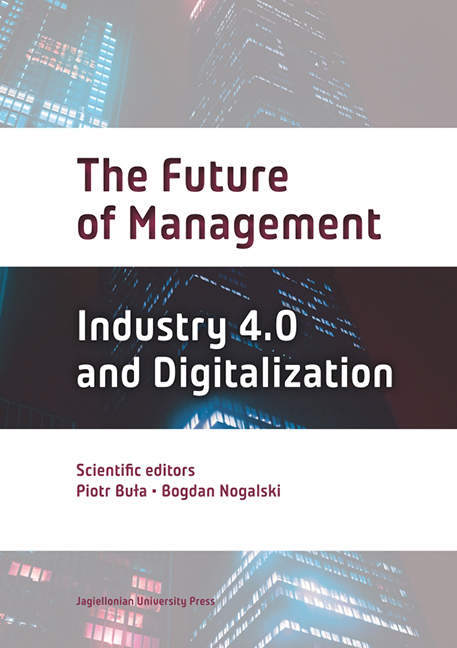Book contents
- Frontmatter
- Contents
- Preface
- Industry 4.0: Social Impacts and Operations Management Challenges
- Business Model Changes in the Presence of Challenges Brought by Industry 4.0
- Communication in Traditional and Network Organisation: Transformation
- Consequences of the Fourth Industrial Revolution in Social and Economic Development in the 21st Century
- Ideology, Trust, and Spirituality: A Framework for Management Control Research in the Era of Industry 4.0
- Renewable Energy through Industry 4.0 on the Example of Photovoltaic Development in Selected European Countries
- Employee Loyalty in the ICT Sector as a Challenge for Building Industry 4.0
- The Importance of Flexibility of Human, Tangible and Intangible Resources in Selected Production Entrepreneurships: Results of Empirical Research
- Challenges Posed for Universities by the Industry 4.0 Environment
- Big Data in Managing Marketing Communication
- Mathematical Risk Assessment Method in the Implementation of Logistic Processes
- Management and Digitisation
- Branding of Time as a New Direction in Tomorrow’s Management
- The Future of Branding
Renewable Energy through Industry 4.0 on the Example of Photovoltaic Development in Selected European Countries
Published online by Cambridge University Press: 16 November 2021
- Frontmatter
- Contents
- Preface
- Industry 4.0: Social Impacts and Operations Management Challenges
- Business Model Changes in the Presence of Challenges Brought by Industry 4.0
- Communication in Traditional and Network Organisation: Transformation
- Consequences of the Fourth Industrial Revolution in Social and Economic Development in the 21st Century
- Ideology, Trust, and Spirituality: A Framework for Management Control Research in the Era of Industry 4.0
- Renewable Energy through Industry 4.0 on the Example of Photovoltaic Development in Selected European Countries
- Employee Loyalty in the ICT Sector as a Challenge for Building Industry 4.0
- The Importance of Flexibility of Human, Tangible and Intangible Resources in Selected Production Entrepreneurships: Results of Empirical Research
- Challenges Posed for Universities by the Industry 4.0 Environment
- Big Data in Managing Marketing Communication
- Mathematical Risk Assessment Method in the Implementation of Logistic Processes
- Management and Digitisation
- Branding of Time as a New Direction in Tomorrow’s Management
- The Future of Branding
Summary
Abstract
The fourth industrial revolution, known as Industry 4.0, is changing the face of business through the integration of digital and physical systems. The emerging cyber-physical systems, together with artificial intelligence, offer completely new possibilities for exploiting the potential of this change. Progressive digitisation and technological progress require equally progressive electrification. The Industry 4.0 influences the use of renewable energy sources not only because of the increased demand, but also because of the many opportunities that renewable energy sources provide. Digital business needs stable and cheap electricity, which solar farms are able to provide. The industrial revolution is an opportunity for the development of industries and the economy, so it is crucial to adopt the right strategy and the right approach, favouring new business models and innovative technologies. They may contribute to reindustrialisation and improvement of the competitive position of the industry in individual countries, including those analysed. Therefore, the aim of the article is to evaluate the possibilities and level of development of solar energy, mainly industrial, in selected European countries: Poland, Germany, Romania, and Ukraine. In the first part of the study the main assumptions of Industry 4.0 are presented. Then the issues related to renewable energy sources, including solar energy, are embedded in them. In the following part of the article, the amount and structure of installed photovoltaic power in the countries surveyed are analysed. In the last part of the study, the level of development of solar energy in the analysed countries is assessed and on this basis the level of implementation of the assumptions included in the Industry 4.0 strategy in the field of energy security is determined.
Keywords: renewable energy sources, photovoltaic, Industry 4.0, industrial revolutions, Internet of Things, smart grid
Background
Observing new trends in technology development, the fourth industrial revolution, referred to as Industry 4.0, has a huge impact on changes in business. The accelerated pace of the digitisation process is changing the face of business and is contributing to an even more dynamic environment and market structure. The first Industrial Revolution in the use of steam and hydropower revolutionised mechanisation processes.
- Type
- Chapter
- Information
- The Future of ManagementVolume Two: Industry 4.0 and Digitalization, pp. 92 - 107Publisher: Jagiellonian University PressPrint publication year: 2022

